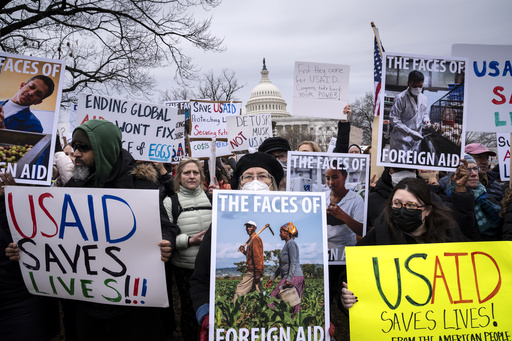Supporters of the U.S. Agency for International Development (USAID) expressed their anger at a rally in Washington on Wednesday, as aid workers stationed overseas hurriedly prepared to leave their posts. This follows an abrupt decision from the Trump administration to withdraw nearly all USAID personnel from active duty in the field.
The sudden directive, issued on Tuesday, comes after a period of over two weeks during which the Trump administration, alongside billionaire Elon Musk’s team, has initiated significant changes at USAID. These alterations threaten to dismantle a longstanding mission that spans six decades, which has focused on enhancing U.S. security through initiatives such as education programs, combating health crises, and advancing international development efforts.
During his visit to Central America, Secretary of State Marco Rubio defended the administration’s sweeping cuts to aid funding, stating that the closure was necessary due to a lack of collaboration in assessing the worth of various programs. Despite hearing no evidence of the alleged opposition from agency staffers, Rubio insisted that the government would follow a grassroots approach to identify which aid missions align with national interests.
“This is not an attempt to eliminate foreign aid, but rather to realign it in a manner that supports the United States’ national goals,” he remarked while in Guatemala City.
In the heart of Washington, hundreds of protesters, including Democratic lawmakers, gathered outside Capitol Hill to oppose the rapid dissolution of an autonomous federal agency. California representative Sara Jacobs labeled the situation as illegal, claiming it resembled a coup.
Maryland Senator Chris Van Hollen echoed these sentiments, describing the events as part of a deeply corrupt arrangement between Musk and Donald Trump as they target USAID among other agencies. Crowd members chanted, “Lock him up!” directed at Musk and expressed discontent with Democratic leaders’ inability to halt the aggressive dismantling of USAID.
Scott Paul, a director at Oxfam America, commented on the significant setbacks, asserting that vital components of the international aid framework would necessitate complete rebuilding. Similarly, Jennifer Kates, overseeing global health policy at KFF, revealed that one organization might have to shut down 1,226 maternal and child-care clinics that aid over 630,000 women due to recent changes.
“The health care framework is intricate; halting services is not as simple as restarting them,” Kates explained, raising concern over the irreversible impacts of the abrupt USAID restructurings.
As USAID faces drastic reductions under the new administration, federal programs labeled as wasteful or inconsistent with conservative priorities are being targeted. U.S. embassies in more than 100 countries had to quickly convene town halls for anxious agency staffers, who sought clarity on their job security. However, embassy officials were left without guidance on how to address the uncertainties clouding local employees’ futures.
One USAID contractor based in a perilous region in the Middle East shared their concerns about safety, as the shutdown made it impossible to contact the U.S. government for assistance during emergencies. The contractor described waking up to find access to crucial communication systems blocked and an emergency app removed from their phone, leaving them feeling isolated from vital support networks.
As rumors about the shutdown circulated, USAID employees grappled with tough decisions about their families’ futures, including the difficult choice of whether to withdraw children from school midyear or give up pets, uncertain of how quickly they would need to evacuate.
Although the government assured USAID staff would be returned home within 30 days, anxiety persisted among many that they could become trapped without proper assistance. The rapid withdrawal of personnel threatens to disrupt billions in ongoing projects worldwide, including vital aid to Ukraine and various development initiatives aimed at providing clean water, job training, and education, particularly for girls under Taliban rule in Afghanistan.
A notification sent to USAID workers indicated that non-essential personnel would be off the job by midnight Friday, allowing direct hires stationed abroad 30 days to return.
As the leading humanitarian donor, the U.S. contributes significantly to global aid despite spending a mere fraction of its overall budget on these efforts, with some countries allocating a larger proportion to foreign aid.
In light of the funding freeze, hundreds of millions of dollars in food and medicine have been unable to reach their destinations, sitting unused in ports. Health programs that previously eradicated diseases like smallpox and polio, along with notable initiatives targeting HIV/AIDS that saved millions in Africa, have come to a halt.
In South Africa, Minister of Health Aaron Motsoaledi reported to Parliament that government officials have had to urgently consult with U.S. Embassy staff for updates after the administration’s unexpected decision to freeze essential funding for the nation’s largest HIV/AIDS program.
With around 8 million HIV-positive individuals, South Africa relies significantly on U.S. funding, accounting for about 17% of its extensive HIV/AIDS program budget. However, Motsoaledi did not clarify whether current exceptions for lifesaving care would affect these operations.
Critics, including Democrats, emphasize that USAID is mandated by law as an independent agency and its closure would require legislative approval. Bipartisan supporters assert that the agency’s work abroad is crucial for countering the influences of global adversaries such as Russia and China and for maintaining international alliances.
As the crisis unfolded, Hakan Bilgin, a representative of a medical NGO based in Istanbul, expressed distress within his organization after receiving a sudden order to cease operations. This resulted in the closure of 12 field hospitals and the layoff of over 300 staff members in northern Syria, highlighting the grave consequences for vulnerable populations reliant on such healthcare services.




